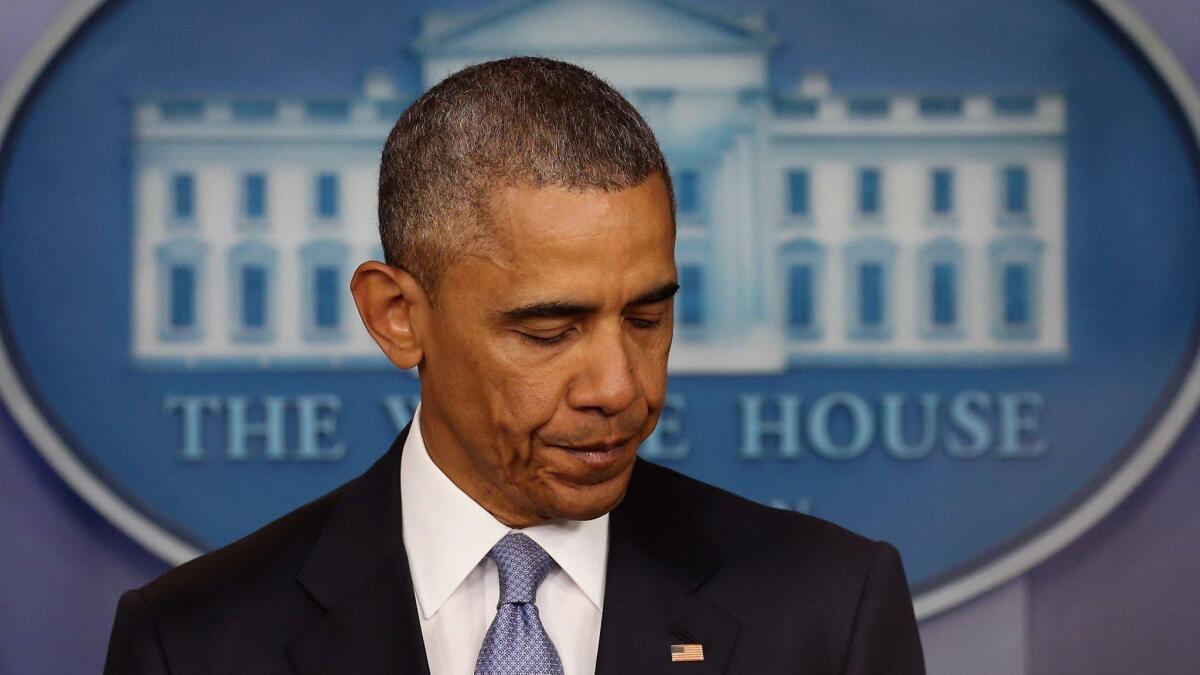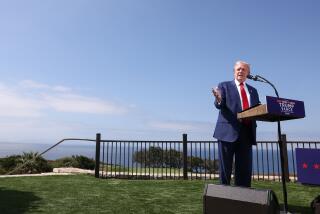Obama makes a push for transparency before handing over executive power to Trump

President Obama at the White House.
Reporting from Washington — President Obama secretively built a massive counterterrorism apparatus, and now he’s confronting the consequences of expanding his war-making powers: handing them over to a man he said was unfit to serve as commander in chief.
With President-elect Donald Trump weeks away from inheriting them, Obama has taken a new approach, advocating for limits and transparency that he often was content to do without.
In a speech Tuesday, Obama defended his approach to national security and explained the legal and policy underpinnings that his administration used to decide whether and how to detain, interrogate or kill suspected terrorists.
The White House also released a 66-page report that offered a view into some of the nation’s most sensitive national security issues, including Obama’s signature tool to fight terrorism: harnessing armed drones, human intelligence and electronic surveillance to “find, fix and finish” thousands of Islamic militants in remote corners of the globe.
“This public information allows for a more informed public debate and it provides a potential check on unfettered executive power,” Obama said in his address before an audience of troops at the military’s Central Command in Tampa, Fla. “The power of the presidency is awesome, but it is supposed to be bound by you, our citizens.”
The efforts at transparency were striking for an administration criticized for being secretive by news and watchdog organizations; Obama has used the Espionage Act more times than all other U.S. presidents combined to investigate leaks of government information.
White House aides said Obama was seeking to set an example for accountability.
“That’s even more important given the kind of open-ended nature of the conflict against terrorism,” deputy national security adviser Ben Rhodes told reporters, adding that the president had sought but not always received greater congressional involvement in fighting war — notably through his request for an updated mandate for military action against Islamic State extremists.
Advocates of greater transparency welcomed Obama’s gesture, but expressed concern at the precedent he set by continuing to assert his authority for expanded counterterrorism operations under the broad authorization for the use of force that Congress passed after 9/11, years before Islamic State and other terrorist groups even existed.
Rep. Adam B. Schiff (D-Burbank), the top Democrat on the House Intelligence Committee, called that “expansive interpretation” an “unfortunate legacy” of the Obama administration.
“We’ve had this confluence of interests between the Congress and the administration — a Congress that didn’t want to vote on it and an administration that didn’t want to tie its own hands,” he said at a breakfast hosted by the Christian Science Monitor. “Now we go into a new administration where the door is left so wide open that there’s no meaningful congressional limitation on the president-elect’s ability to go to war.”
As he prepares to depart office, Obama made a more forceful push for a new law that more carefully defined presidential power.
“Democracies should not operate in a state of permanently authorized war. That’s not good for our military; it’s not good for our democracy,” he said.
Naureen Shah, director of Amnesty International USA’s human rights program, said she strongly disagrees with parts of the administration’s national security rule book, but applauded the rare step toward transparency.
“When the U.S. government shares documents like these publicly, it’s a sign that those in power value accountability and an informed debate,” she said. “Now, with a Trump administration on the horizon, it is more important than ever that we do not forget those values.”
Obama did not name Trump but reprised some criticisms of him from the campaign, counseling against Trump’s calls to heavily bomb territory held by Islamic State and his promise to build a wall along the border with Mexico.
“Rather than offer false promises that we can eliminate terrorism by dropping more bombs, or deploying more and more troops, or fencing ourselves off from the rest of the world, we have to take a long view of the terrorist threat,” Obama said. “We have to pursue a smart strategy that can be sustained.”
Aides said Obama’s address, a summation of his national security policy, was planned before the election.
“Part of this is putting down a stake that [says], ‘We had it right. And if others have less success, we gave them the instruction manual,’” said Jon Alterman, director of the Middle East program at the Washington-based Center for Strategic and International Studies.
Trump has not specified how he would approach counterterrorism differently than Obama, beyond his vow “to quickly and decisively bomb the hell out of” Islamic State, as he put it in one campaign advertisement. He has also said the Obama administration has too often telegraphed its military tactics, most notably in a recent Iraqi-led campaign to recapture Mosul from Islamic State.
Obama’s address sought to demonstrate the virtue of a muscular but restrained approach.
“The president wants to convey that the counterterrorism instruments we have provide all of the elements of surprise that the president-elect thinks are important in policy,” Alterman said. “The other piece is that presidents believe that you have to be remarkably disciplined in the use of force. And his fear is that the president-elect and his team will overlook the first, and feel they have to abandon the second in order to retain the element of surprise.”
The president also made a final appeal to realize the goal set in his first executive order: the closure of the military detention facility at Guantanamo Bay, Cuba. While he has severely drawn down its population, Congress has erected roadblocks to closing it.
“Until Congress changes course, it will be judged harshly by history. And I will continue to do all that I can to remove this blot on our national honor,” Obama said.
Times staff writer David Lauter contributed to this report.
Twitter: @wjhenn, @mikememoli
ALSO:
Climate change is real: Just ask the Pentagon
Overweight, tattooed, stoned? The Pentagon may still want you
UPDATES:
4:20 p.m: This story was updated with Obama’s comment.
This story was originally published at 3 a.m.
More to Read
Get the L.A. Times Politics newsletter
Deeply reported insights into legislation, politics and policy from Sacramento, Washington and beyond. In your inbox three times per week.
You may occasionally receive promotional content from the Los Angeles Times.












